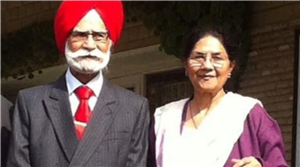Balbir Singh Sr, one of India's greatest hockey players who won three Olympic gold medals in a stellar career, had passed away here in May 2020 at the age of 96 after battling multiple health issues.
Hockey legend Balbir Singh Sr lived his life for the sport and would have jumped in joy had he been alive to witness the national team’s historic bronze-medal winning feat at Tokyo Olympics, his daughter Sushbir Kaur said on Thursday.
The Indian men’s hockey team scripted history at Tokyo, claiming an Olympic medal after 41 years, following a thrilling 5-4 win over a plucky Germany in the bronze medal play-off.
“He would have been very happy. He would have jumped in joy,” Kaur told PTI.
“When our family was watching the match on TV, I turned around and looked at the chair where he used to sit with us and watch every match involving Indian hockey team.
“He used to keenly watch the game and enjoy exciting moments. He lived his life for hockey. For him, the national flag and tricolour were his life.”
Balbir Singh Sr, one of India’s greatest hockey players who won three Olympic gold medals in a stellar career, had passed away here in May 2020 at the age of 96 after battling multiple health issues.
While the Indian men’s team claimed a bronze, its women counterparts are also one step away from returning with a medal as Rani Rampal and co faces Great Britain in the bronze medal play-off on Friday.
Kaur said: “This is a new chapter for Indian hockey. Because this will encourage budding talent. Had our performance not been good in this Olympics, it would have dealt a blow.
“If hockey gets more popular, it will attract more sponsors, which will further help the game,” she added.
The Indians showed great determination as they made a memorable comeback, fighting back from a two-goal deficit to turn the match in their favour after being 1-3 down.
“The good thing in this team is that it has a very good fighting spirit and the comeback spirit is there and it does not get bowed down under pressure,” Kaur said.
She recalled many interactions which her father had with the Indian hockey team members, including the junior talent from time to time.
“Whenever he used to meet budding talent, he used to tell them to work hard and win games, telling them that it will bring them honour. Dream big, aim high, work hard and think positive, he used to say. He also used to tell them that the spot at the top is always vacant,” she said.
In the match, Simranjeet Singh (17th, 34th minutes), Hardik Singh (27th), Harmanpreet Singh (29th) and Rupinder Pal Singh (31st) were the goal getters for India.
Kaur recalled that during a hockey event many years ago, Balbir Singh Sr had met Harmanpreet and had praised him for his talent.
“At that time, Harmanpreet used to wear No 1 jersey and we told him jokingly that Balbir ji used to wear No 13 jersey and look he created records. Now, even Harmanpreet wears number 13 jersey.
“I must say that all players in the current team are very good and they have bright future ahead,” she said.
One of the country’s most accomplished athletes, Balbir Singh Sr was the only Indian among 16 legends chosen by the International Olympic Committee across modern Olympic history.
His world record for most goals scored by an individual in the men’s hockey final of the Olympics still remains unbeaten.
He had scored five goals in India’s 6-1 victory over the Netherlands in the gold medal match of the 1952 Helsinki Games. He was conferred with the Padma Shri in 1957.
That was the first time an athlete was conferred the prestigious civilian honour.
Singh’s three Olympic gold medals came in London (1948), Helsinki (1952) as vice-captain, and Melbourne (1956) as captain.
He was also the manager of India’s only World Cup-winning side in 1975.
Source: Read Full Article



